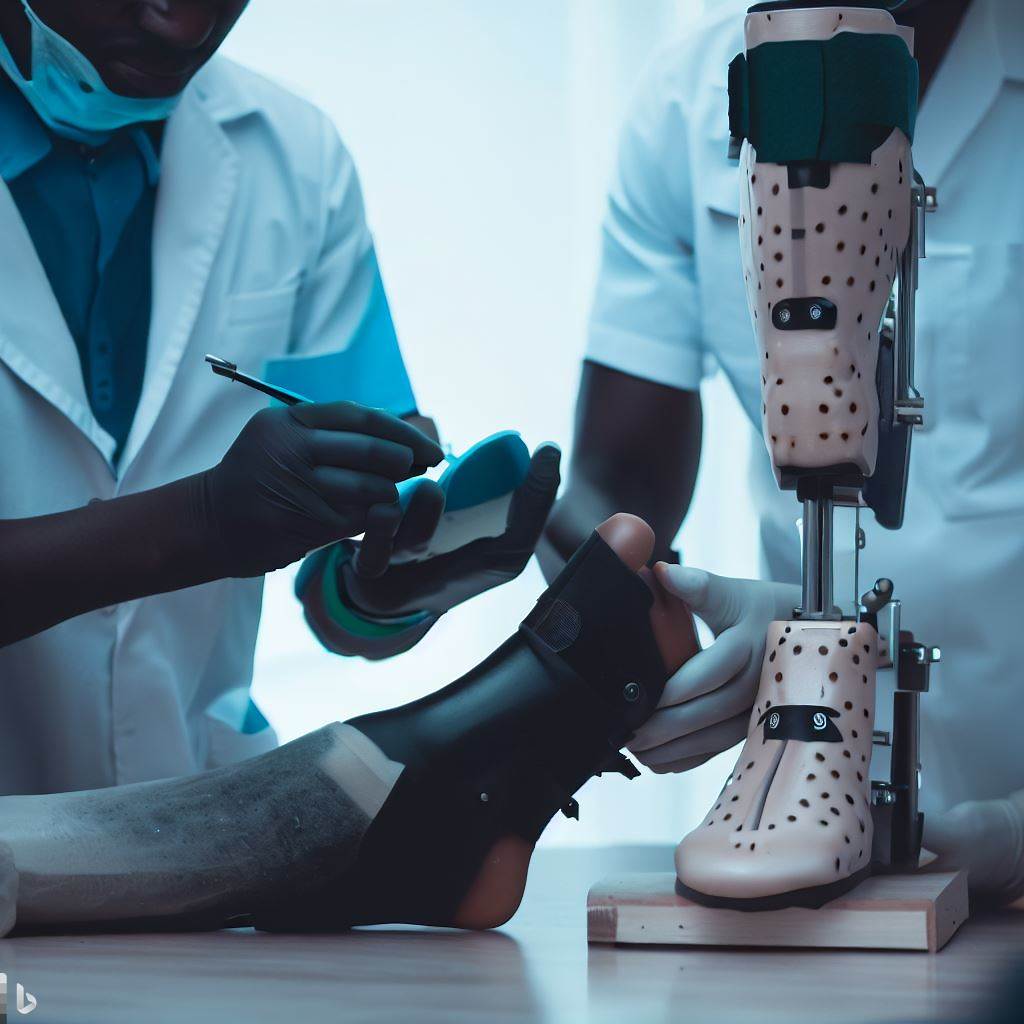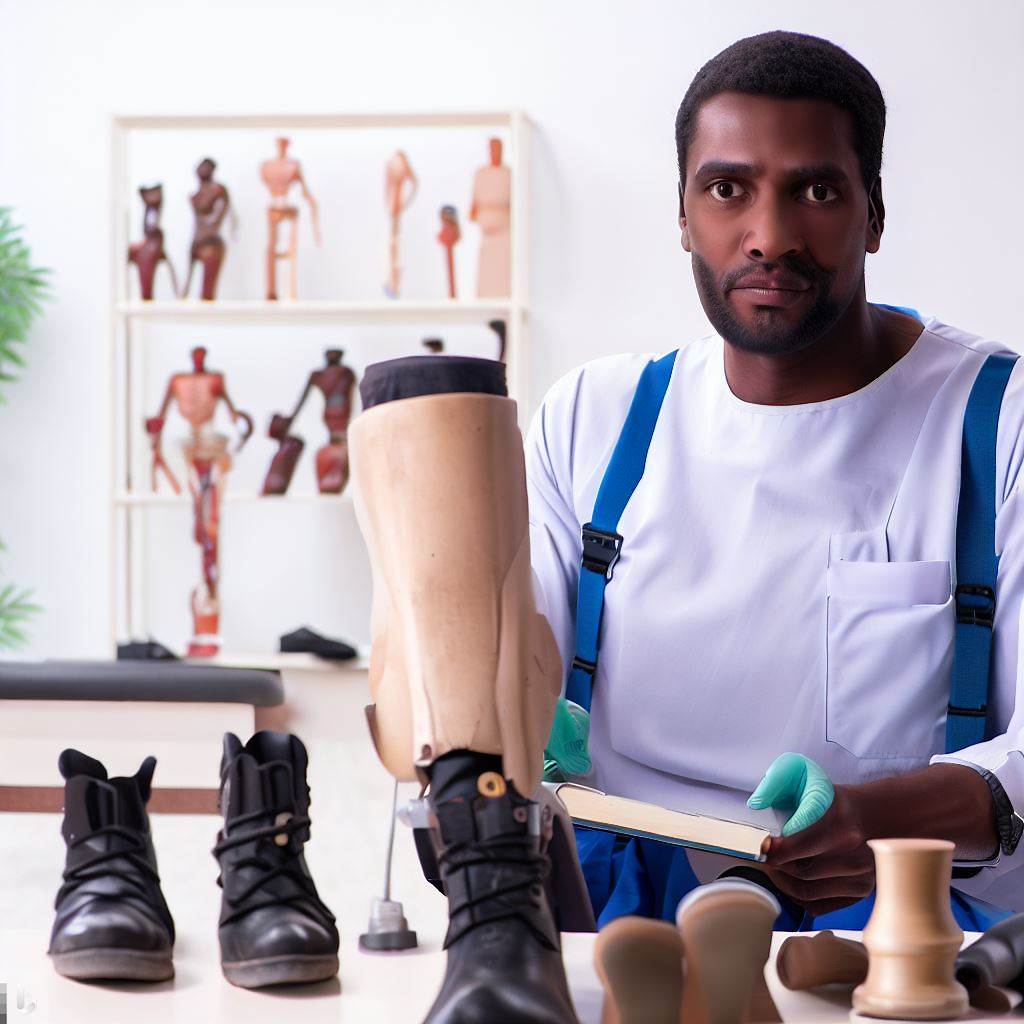Introduction
Orthotic and prosthetic care in Nigeria aims to offer essential devices and assistance to individuals with musculoskeletal disabilities, enhancing their quality of life and independence.
By providing orthoses and prostheses, this specialized field facilitates mobility and functionality for those in need.
With the significance of advancements in Nigeria, there is a growing focus on improving orthotic and prosthetic care.
These advancements encompass technological innovations, research developments, and improved accessibility to services.
By embracing these progressions, the country can better cater to the diverse needs of its population with physical impairments, enabling them to lead more fulfilling lives.
Therefore, recognizing the importance of orthotic and prosthetic care and promoting advancements in this field can make a substantial difference in the lives of individuals with musculoskeletal disabilities in Nigeria.
By continually striving for better solutions and increasing awareness, the nation can create a more inclusive and supportive environment for those who rely on orthotic and prosthetic care to thrive.
Historical Overview of Orthotic and Prosthetic Care in Nigeria
Early developments in orthotics and prosthetics
Advancements in Orthotic and Prosthetic Care in Nigeria have a rich history, with early developments dating back to the late 19th century.
The progress was significantly influenced by European colonialism and missionary activities.
During this period, orthotic and prosthetic devices saw significant improvements, thanks to the establishment of orthopedic workshops in mission hospitals.
These workshops played a crucial role in introducing basic orthotic and prosthetic care in the country, setting the foundation for further advancements in the field.
Today, Nigeria continues to build upon its historical developments, providing improved and sophisticated orthotic and prosthetic care to enhance the lives of individuals with physical disabilities.
Challenges faced in the past
Limited availability of trained professionals:
In the early years, there was a lack of trained orthotists and prosthetists in Nigeria.
This resulted in a scarcity of individuals who could provide proper care and services to patients in need.
It took considerable time for the field to develop and for professionals to become readily available.
Lack of infrastructure and resources:
The orthotic and prosthetic industry faced significant challenges due to a lack of infrastructure and resources in Nigeria.
There was a dearth of specialized equipment, materials, and facilities required for comprehensive care.
This lack of resources hindered the progress and accessibility of orthotic and prosthetic services in the country.
Despite these challenges, Nigeria has made significant strides in orthotic and prosthetic care.
Recognizing the importance of rehabilitation services, the government and organizations invested in the field, leading to an increase in trained professionals and specialized institutions.
Collaborations with international partners and innovative technologies have also played a vital role in enhancing the quality of care.
Thanks to these developments, more patients can now access the orthotic and prosthetic care they require.
With a growing number of trained professionals and improved infrastructure and resources, treatments have become more efficient and effective.
Nonetheless, there is still room for improvement. Nigeria should focus on expanding training programs, maintaining and upgrading equipment and facilities, and ensuring equitable access to care for all individuals in need.
In short, the historical overview of orthotic and prosthetic care in Nigeria reveals past challenges due to a lack of trained professionals and inadequate infrastructure.
However, recent advancements and investments have positively impacted the field, resulting in improved care and better outcomes for patients requiring orthotic and prosthetic devices.
To further enhance the field, continued efforts and investments are necessary.
Read: Life of an Orthotist/Prosthetist in Nigeria Revealed
Recent Advancements in Orthotic and Prosthetic Care in Nigeria
Increased accessibility to trained professionals
- Specialized training programs have been implemented to enhance the skills of orthotic and prosthetic professionals in Nigeria.
- Collaboration with international organizations has facilitated knowledge transfer and expertise exchange in the field.
Technological innovations in orthotic and prosthetic devices
- 3D printing technology has revolutionized the production process of orthotic and prosthetic devices, leading to more accurate and personalized solutions.
- The use of lightweight and customizable materials has improved the comfort and functionality of orthotic and prosthetic devices.
Improved infrastructure and resources
- Specialized orthotic and prosthetic centers have been established to provide comprehensive care and services to individuals in need.
- The development of manufacturing facilities has increased the domestic production of orthotic and prosthetic devices, reducing dependency on imports.
Recent advancements in orthotic and prosthetic care in Nigeria have significantly improved the quality of life for individuals with physical disabilities.
Access to trained professionals has drastically increased, thanks to specialized training programs and collaborations with international organizations.
One of the most notable advancements is the introduction of 3D printing technology in the production of orthotic and prosthetic devices.
This technology allows for precise and customized solutions, ensuring a better fit and functionality for patients.
Additionally, the utilization of lightweight and customizable materials has enhanced the overall comfort and durability of these devices.
Improved infrastructure and resources have also played a vital role in advancing orthotic and prosthetic care in Nigeria.
The establishment of specialized orthotic and prosthetic centers has centralized expertise, allowing for comprehensive care and services to be provided in one location.
This has eliminated the need for patients to travel long distances to receive proper treatment.
The development of manufacturing facilities within the country has also contributed to the advancement of orthotic and prosthetic care.
Previously, Nigeria heavily relied on imports for these devices, resulting in high costs and limited accessibility.
However, with the establishment of domestic manufacturing facilities, production has become more cost-effective, and the availability of orthotic and prosthetic devices has increased significantly.
Essentially, recent advancements in orthotic and prosthetic care in Nigeria have been driven by increased accessibility to trained professionals, technological innovations in device production, and improved infrastructure and resources.
These advancements have positively impacted individuals with physical disabilities, allowing them to lead more independent and fulfilling lives.
Read: Current Opportunities for Medical Lab Technicians in Nigeria

Impact of Advancements in Orthotic and Prosthetic Care in Nigeria
Enhanced quality of life for individuals with physical disabilities
Advancements in orthotic and prosthetic care in Nigeria have significantly improved the quality of life for individuals with physical disabilities.
With access to better orthotic and prosthetic devices, these individuals can now perform daily tasks more independently.
Improved mobility and functionality facilitate their inclusion in various social and economic activities.
The ability to move and function without limitations allows them to lead more fulfilling and satisfying lives.
They can engage in hobbies, sports, and recreational activities, promoting physical and mental well-being.
Increased mobility and functionality
The advancements in orthotic and prosthetic care in Nigeria have provided individuals with physical disabilities increased mobility and functionality.
With the use of modern and well-fitted devices, they can now move around more easily and efficiently.
Orthotic devices help correct physical deformities and provide support to weakened body parts, improving overall mobility.
Prosthetic limbs enable individuals with amputations to regain lost functionality, allowing them to perform daily tasks with greater ease.
This increased mobility and functionality positively impact their independence, productivity, and overall well-being.
Read: Top Institutions to Study Phlebotomy in Nigeria
Improved economic opportunities for orthotic and prosthetic professionals
Advancements in orthotic and prosthetic care in Nigeria have also opened up improved economic opportunities for orthotic and prosthetic professionals.
The demand for specialized orthotic and prosthetic services has increased as more individuals benefit from these advancements.
Orthotic and prosthetic professionals can now have more clients and patients, leading to a growth in their practices and businesses.
This increase in demand has created job opportunities and increased the earning potential for these professionals.
Furthermore, the need for ongoing maintenance and replacement of orthotic and prosthetic devices ensures a stable and sustainable market.
Basically, the advancements in orthotic and prosthetic care in Nigeria have brought about significant positive impacts.
Individuals with physical disabilities now experience an enhanced quality of life, improved mobility, and increased functionality.
They can participate more fully in society, leading fulfilling lives.
Moreover, these advancements have opened up better economic opportunities for orthotic and prosthetic professionals, promoting growth in their respective fields.
Overall, the impact of advancements in orthotic and prosthetic care extends beyond the individuals directly benefiting from it, to the broader society as a whole.
Read: Orthotic and Prosthetic Jobs in Nigeria: Scope & Pay
Challenges and Future Outlook
Throughout the advancements in orthotic and prosthetic care in Nigeria, there are challenges that need to be addressed to ensure the sustainability of these improvements.
Sustainability of advancements
Two key challenges involve funding and financial support, as well as continued training and professional development.
Funding and Financial Support
One of the main obstacles to sustaining advancements in orthotic and prosthetic care is securing funding.
Without adequate financial support, it becomes challenging to invest in research, purchase advanced technologies, and provide quality care to patients.
To overcome this challenge, it is crucial to establish sources of funding from both public and private sectors. This can be done through partnerships, grants, and philanthropic contributions.
Continued Training and Professional Development
With advancements in orthotic and prosthetic technologies, healthcare professionals need to continually upgrade their skills and knowledge.
It is essential to invest in their ongoing education and professional development.
Workshops, conferences, and seminars should be organized to keep healthcare practitioners updated with the latest techniques and best practices.
By doing so, the quality of care provided to patients will improve, and the field will continue to progress.
Read: The Journey to Becoming a Registered Nurse in Nigeria
Addressing the needs of underserved regions
Underserved regions also need attention to ensure equitable access to orthotic and prosthetic care. Addressing the needs of these regions requires specific strategies.
Outreach Programs and Mobile Clinics
Remote areas and underserved communities often lack access to healthcare facilities. Organizing outreach programs and mobile clinics can help bridge this gap.
Healthcare professionals can travel to these areas and provide orthotic and prosthetic care directly to the residents. Such programs should be regular and prioritize areas that are most in need.
Policy and Government Support
Advocacy for policies that prioritize orthotic and prosthetic care is vital. Governments should be encouraged to allocate funds specifically for these services.
Policies can focus on improving service delivery, expanding coverage, and establishing quality standards.
Government support is crucial to ensure adequate resources and infrastructure for orthotic and prosthetic care in both urban and rural areas.
Looking ahead, the future outlook of orthotic and prosthetic care in Nigeria is promising. However, it requires sustained efforts to overcome challenges and address the needs of underserved regions.
By securing funding, providing continuous training and professional development, organizing outreach programs, and advocating for government support, advancements in orthotic and prosthetic care can thrive.
With these initiatives, more individuals in need will have access to quality care, ultimately improving their quality of life.
Read: Understanding the Salary Scale for Nursing Assistants in Nigeria
Conclusion
Advancements in Orthotic and Prosthetic Care in Nigeria have been remarkable. The country has made significant progress in enhancing the quality and accessibility of these services.
Ongoing efforts, including research, training programs, and collaborations with international organizations, are vital to further improve care.
Despite challenges, there is hope for a brighter future. By focusing on enhancing infrastructure, expanding education, and increasing awareness, Nigeria can provide better care and support to those in need.
Continued dedication to innovation and cooperation will contribute to the continued growth of orthotic and prosthetic care in the country. In a nutshell, Nigeria’s strides in this field show promise for an improved and more inclusive future.




